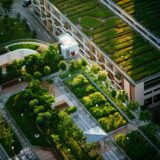Protecting natural resources is becoming crucial for a sustainable future. One of the biggest challenges of the 21st century is access to clean drinking water, which is essential for the survival of humans and other living creatures. Due to rapid population growth, climate change and pollution, water resources are increasingly threatened, affecting their availability and quality.
While drinking water is already overused in many areas, natural solutions to save water and reduce dependence on public water sources are increasingly sought after. One of the most effective and affordable solutions that can be implemented today is rainwater harvesting. Rainwater, which usually flows into drains or sinks into the ground, is a valuable resource that can be collected, stored and used for various purposes with appropriate systems. What are the possibilities for its use and why is this solution important for the future of our planet?
Why collect rainwater?
Rainwater harvesting is not just a simple practice for reducing water costs, but an important step towards sustainable management of natural resources. It is a solution that can help reduce pressure on drinking water, improve the quality of living and preserve the environment for future generations.
In most households, huge amounts of drinking water are used for tasks for which high water quality is not so necessary – these include watering the garden, washing cars, flushing toilets and washing clothes. By collecting rainwater, we can cover a lot of these needs with water that would otherwise not be used, thereby reducing the burden on local water resources and consequently water costs.
With rainwater harvesting systems, households and individuals can at least partially supply their own water, which increases self-sufficiency and reduces dependence on public water networks. This is especially important during periods of drought or in the event of disruptions in the water supply. When it rains, most of the water in urban areas quickly drains off asphalt, concrete and other surfaces into sewer systems – resulting in overburdened sewer systems and the risk of flooding. Reducing the use of drinking water also directly contributes to the protection of natural resources. The rainwater that we collect and use locally not only helps us, but also the entire ecosystem.
Rainwater is naturally soft water, which means it does not contain limestone, which is often found in tap water. It is particularly beneficial for appliances such as washing machines, as soft water prevents limescale build-up, which extends the life of such appliances and reduces maintenance costs. Soft water also has a positive effect on the vegetables and plants we water, as it enables better absorption of nutrients from the soil.
Reduction of costs and energy consumption
The water we receive from public systems often requires purification and distribution processes that are energy-intensive and expensive. By collecting rainwater, we directly reduce the need for such procedures and help reduce water costs and energy consumption. In the long run, this is also reflected in lower costs for users, and at the same time has a positive impact on the environment.
Rainwater harvesting systems are relatively simple and affordable. Basic systems that enable quick and efficient water collection include the roof surface, gutters, filters and collectors. Such systems can be adapted to different needs, from small households to larger farms. Modern collection systems also include sophisticated filtering and storage methods and ensure the safe and efficient use of rainwater for various purposes.
Although not everyone has the opportunity to install larger rainwater collection systems, they can still use it effectively to water the garden. A simple solution is to use plastic barrels with a lid, which are placed under the drain pipe on the roof. It is recommended to choose barrels with a capacity between 200 and 500 liters, as these are large enough to collect a sufficient amount of water, but at the same time do not take up too much space. It is recommended that the barrel is made of dark plastic and has a lid, as it does not allow light to pass through and reduces the formation of algae. To optimally maintain water quality and prevent the development of microorganisms, it is best to place the barrel on the shady, north side of the house.
Rainwater harvesting is a simple but effective solution and enables the reduction of drinking water consumption, conservation of natural resources, reduction of costs and adaptation to climate change. It is a practice that can have a positive effect on both the individual and the entire community. By establishing a rainwater collection system, we not only reduce the pressure on public water resources, but actively contribute to a sustainable future.
For more information or a consultation, please contact us; Phone: 00386-40-626-131, Email: tajnistvo@bazarealestate.com.





